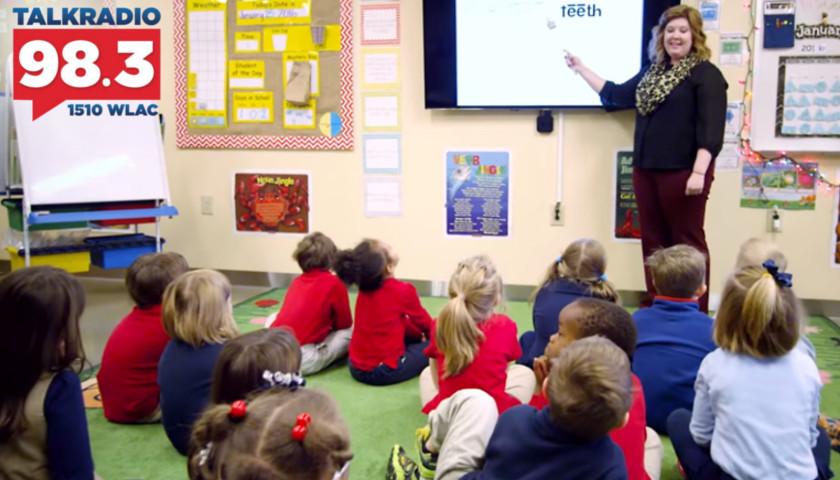Monday morning on The Tennessee Star Report with Michael Patrick Leahy – broadcast on Nashville’s Talk Radio 98.3 and 1510 WLAC weekdays from 5:00 am to 8:00 am – host Michael Patrick Leahy was joined in studio by veteran grassroots activists Kevin and Laura Baigert to discuss the teaching methodology called “direct instruction.”
During the middle of the hour, Leahy and the Baigert’s discussed what they’ve witnessed at the school board level and noticed that there is an inverted pyramid that has teachers and students at the bottom covered in multiple layers of bureaucracy.
Leahy voiced concern that public education has now become a political weapon at the expense of the children and their parents. Laura Baigert agreed stating, ‘They’re (the parents) afraid of retribution if anything. So you speak out and you’re punished. We have parents telling us that all the time because we are so active. That’s pretty scary. Who are we here for?’
Leahy: Go to our lead story at the TenenseeStar.com and you’ll see our parent corporation, Star News Digital media has a statement of principles on K-12 education. Number one, direct instruction is the most effective way to teach the basics of reading, writing and arithmetic.
And it should become the preferred teaching methodology in all elementary schools in America. Now, Laura, you’ve come to know a group here called Thales Academy they’ve been very successful doing this in North Carolina. They’ll be coming to Nashville this coming academic year. You saw their presentation. How does that strike you with direct instruction as a methodology?
Baigert: Well, what’s interesting to me is that it seemed to be like the way we learned. With the teacher upfront and kind of walking you through each lesson. And then all the children participating at one time and not advancing through anything else until everybody gets it. And as a building block, you get step one before you move on to step two.
Leahy: Exactly. And you master it. We have a more detailed clip on what direct instruction is right here.
(Direct instruction clip plays)
Leahy: So Kevin Baigert, all of the studies show that direct instruction brings superior performance to kids K-5 and yet, it is a teaching methodology not widely used. It’s been very effective and around for 60 years. But you go into a public school today and they’re not using direct instruction even though it brings better results. What do you make of that Kev?
K. Baigert: Well, that tells me one thing. The real goal of our current education system is NOT to enhance the education of the student. It’s really not to drive perfection or advancement with the individual student. It’s really to support the system. And that’s fundamentally what’s wrong. We’ve gotten out of control. We’ve politicized this basic need to educate our children and we’re using it as a weapon. And it’s just wrong.
Leahy: And a political weapon. And now the whole discussion is are we paying teachers enough or not. And if you’re a teacher by the way and you have a point of view on this give us a call. Laura, it seems to me there are a lot of teachers who want to do a good job but they’re stuck in this system where they’re using common core which is an utter disaster. Have you looked at the homework given to kids on how to do like 2+2 and basic stuff?
Baigert: It’s horrible. And Governor Lee ran on that and talked about how even he as an engineer couldn’t figure out some homework that friend of his showed. It’s like first-grade math and an engineer can’t figure out how to do this.
We talk about kids being able to be economically independent when they come out of high school. I don’t even know how they can survive advancing into college if we can’t understand what they’re doing. If it doesn’t translate into practical studies like engineering.
Leahy: Yeah. And the common core thing we talked about is, go into any math class, and by the way, if you’re a math teacher give us a call. What it looks like is they’re trying to make it complex and hard when it’s simply easy. This is something to learn by rote shall wee say and then build after that.
So, number one, direct instruction which is seen in maybe less than 1/2 of 1% of schools. Ought to be in 100% of schools in my view. Another part of this, I want to get your reaction to this. Individual and local sovereignty and accountability should become the required standard for public school governance.
Now, note, we say individual and local sovereignty. What does that mean? It means parents should be the determiner. But they should also be accountable. Which means engaged. And not all parents are engaged. That’s quite true. But then local sovereignty, what does that mean?
It means that the school board, we elect school boards here, the school board ought to be sovereign. And yet, if you look at how school boards have evolved over the past couple of decades, school boards may be elected but in most counties, the school board members themselves don’t consider themselves sovereign. Have you noticed that Kevin?
Baigert: Absolutely Michael. We’ve witnessed first-hand several counties within middle Tennessee where we’ve gone to school board meetings. Williamson County and Sumner County to be specific. It’s like watching a group of bobbleheads. (Leahy laughs)
Leahy: You mean the board members?
Baigert: That’s right the board members. The director of schools says jump. And they all shake their heads yes, yes, yes, yes. It’s just ridiculous how they’ve basically given up their control.
Leahy: Yeah. It seems odd. But part of that is because when you’re elected, it’s a lot of time and effort to get elected to your local school board. So you go out and get elected and what’s the first thing they do? They send you to this training session. It’s the Tennessee State School Board Association. And in this training session, they basically tell you your job is not to tell the principal what to do or the director of schools what to do. But to do whatever he tells you. That’s wrong!
L. Baigert: Yeah, and it’s very obvious. They hire the director of schools and yet they answer to the director of schools. What do you think about going back to an elected superintendent?
Leahy: Well that’s one possible method of control. The irony here in Tennessee is there was a period of time when each county would elect a school superintendent and the idea was, ‘Well we can’t have it political. The result actually of the way it works today is that the school superintendents are not stupid.
And they’ve realized that the way to have control is to get your slate of candidates elected to the school board. Work with the Tennessee state school board association. Have school board members come in and have them indoctrinated into this understanding that, ‘Oh, you don’t run the school, the director of schools runs the school.’ That’s what happened in Williamson county.
K. Baigert: Exact same thing in Sumner county. Exact same thing.
Leahy: And it’s happening all over the country. And so what you have is school administrators who are making like $200,000 a year. $300,000 a year. They don’t want to rock the boat. It’s a good gig right?
K. Baigert: And these school superintendents are products of what I call the education industrial complex. They’re all Ph.D. level people that come out of these educational think tanks. And they’ve got all these crazy ideas. And then they create this inverted pyramid where at the bottom of the period you’ve got a teacher and a student. Then you’ve got huge multiple layers of bureaucracy consuming the gross amount of tax dollars. 80 something percent of Sumner County.
Leahy: Yeah, exactly. Well and now we’re looking at a situation where it’s as you say been inverted and as a result parents have very very little control over what their kids are learning. I see this with parents a lot, they’re very frustrated right? But they don’t feel like they have any power.
L. Baigert: Oh no and they don’t. They’re afraid of retribution if anything. So you speak out and you’re punished. We have parents telling us that all the time because we are so active. That’s pretty scary. Who are we here for?
Leahy: Well obviously the teacher’s union would say you’re there to get more pay for the teachers. The Tennessee Organizational School of Superintendatns you’re there so the school superintendents can keep their cushy positions. And the state school board associations say well we’re here to serve the educational complex and don’t rock the boat. And oh, by the way, kids not really learning all that well. Who’s problem is that?
L. Baigert: We’res the lobbying group on behalf of the children.
Leahy: Yeah well, it should be the electorate. The way it’s working right now, it’s not.
Listen to the third hour:
– – –
Tune in weekdays from 5:00 – 8:00 am to the Tennessee Star Report with Michael Patrick Leahy on Talk Radio 98.3 FM WLAC 1510. Listen online at iHeart Radio.
Photo “Direct Instruction in Action” by Thales Academy.






Spot on for Sumner County. “Lord” Phillips tells the board what to do and the County Commission rubber stamps the ever increasing costs passed along through the board. Phillips got a large pay raise rushed through for those “certified” by claiming it was for the teachers but many non-teachers are certified.